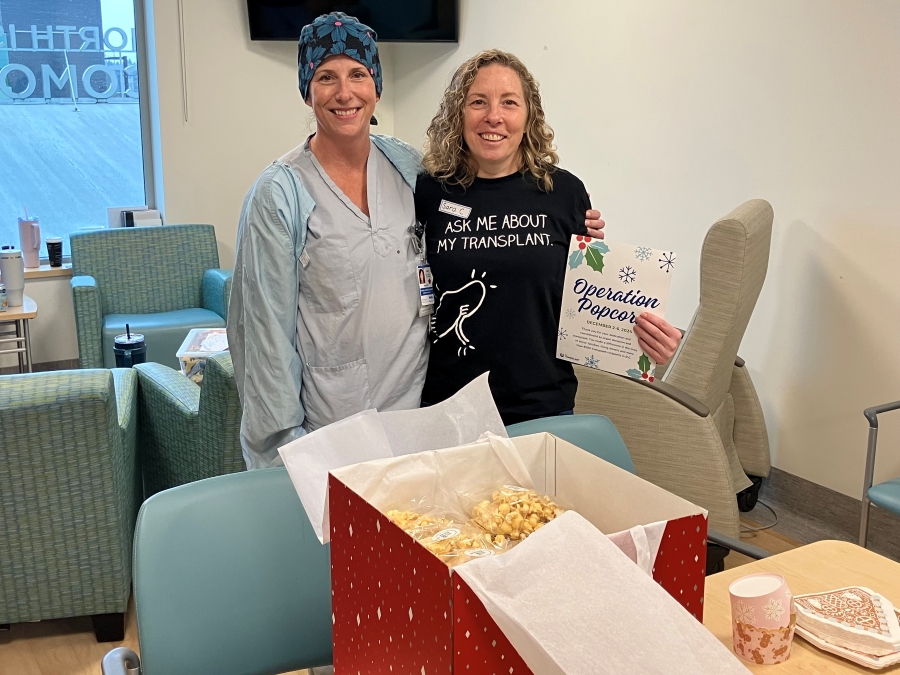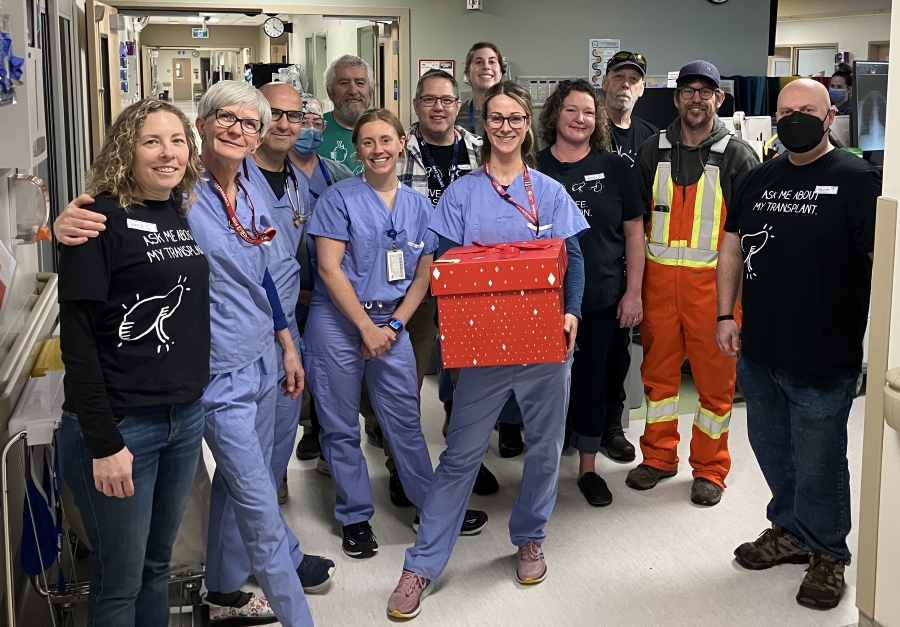As a student nurse, then as an operating room (OR) nurse, and now as a nurse in the preadmission and booking office at North Island Hospital Comox Valley, Sara Cherewaty has witnessed firsthand the life changing impacts of organ donation.
Pictured: Tracey Hrysio and Sara Cherewaty
“In nursing school, I learned about organ donation and transplants, and later, while working as an OR nurse at the Royal Jubilee Hospital in Victoria, I participated in an organ retrieval surgery,” said Cherewaty. “It was the most touching and trying surgery I was ever a part of. To think about how many lives were going to be saved and changed by this one individual’s organs made me cry. At the time, I didn’t imagine that I would ever need a transplant myself.”
In 2001, Cherewaty was diagnosed with Polycystic Kidney Disease (PCKD) caused by a genetic disorder where cysts grow in the kidneys. “Generally, people who have PCKD don’t have liver involvement,” she explained. “Unfortunately, I did.”
With the help of her nephrologist, Cherewaty managed to maintain her kidney function through a healthy lifestyle, however, the cysts spread to her liver.
“As time went on, the cysts on my liver caused it to grow to where it filled my entire abdominal cavity. It was extremely uncomfortable, and it had a direct and dramatic impact on my life and my physical, emotional and mental health.”
“I had to leave my job as an OR nurse. I was unable to take part in the activities I loved and had difficulty playing with my daughter,” she said.
After two surgeries to drain some of the cysts on her liver and reduce swelling, Cherewaty was informed that she would need a liver transplant to cure her Polycystic Liver Disease (PLD).
This diagnosis meant Cherewaty was now on a waiting list for a liver transplant.
“I couldn’t go anywhere without my cellphone, in case I got ‘the call’”, explained Cherewaty. “Everywhere I went, I mentally planned out what I would do if I suddenly had to go to Vancouver for a transplant. It was a very difficult time for me.”
Cherewaty waited 18 months before she finally got the life changing call that a donor liver was available.
“I couldn’t be more thankful for the entire health care team I had, from the lab techs to the surgical team,” said Cherewaty. “I feel very lucky because my care team was amazing. I’m also grateful for all the support from my colleagues.”
“We were all rooting for Sara,” said Samantha Kennedy, Clinical Nurse Leader at North Island Hospital Comox Valley. “We were hopeful she would get a donor, and when she did the entire team was behind her all the way.”
“I’m getting close to the three-year anniversary of my surgery, and I am doing very well,” reflected Cherewaty. “I would not have made it this far without the support of many friends and family and this amazing community. My family and I are so thankful, and I am forever grateful to the donor for the gift of life they gave me.”
Emergency Department team at North Island Hospital - Comox Valley
While most people will never need an organ transplant, those who do must wait for the right set of circumstances. Organ donations only take place after all other life-saving efforts have been made for the donor. In fact, only 1% of deaths that occur meet the criteria for organ donation. The three types of criteria are:
- Death Determination by Neurologic Criteria (DNC), also referred to as brain death, is when the brain has permanently lost all function and a diagnosis of death using neurological criteria is met;
- Death Determination by Circulatory Criteria (DCC) is when a person’s heart has permanently stopped beating and death is determined by circulatory criteria, or the patient has severe brain injuries and a decision has been made to remove all life-sustaining treatments; or
- Death by Medical Assistance in Dying (MAiD) and is the same as pathway as Death Determination by Circulatory Criteria (DCC) where the process to end life will occur in the hospital.
“We never want to think about a family member or friend dying, and discussions about organ donation can be difficult. However, having discussions in advance can relieve a family of the burden of making decisions during a time of crisis and loss,” said Cherewaty.
Each December, BC Transplant celebrates Operation Popcorn, where volunteers visit hospitals and transplant clinics with boxes of popcorn to thank health care providers like Cherewaty who make organ donation and transplant a reality. As an Island Health nurse and a liver transplant recipient, Cherewaty’s unique position has made her even more acutely aware of the importance of organ donation.
BC has had an online organ donor registry for more than 25 years. “If you died today, could your death help someone on this list? That is, are you registered as an organ donor?” asked Cherewaty. “When I ask people this question, most people say “Yes, my consent to donate is on my driver’s licence” but that answer is incorrect! You must officially register your decision regarding organ donation with BC Transplant.”
“It’s so important for everyone to think about organ donation as part of their end-of-life wishes, speak with their family and then register their decision,” said David Torney, BC Transplant Organ Donation Coordinator in Nanaimo. “It takes only two minutes and all you need is your Personal Health Number. You could save up to eight lives as an organ donor.”
In 2023, 563 British Columbians received a transplant from 160 deceased donors and 77 living kidney donors. There are currently 1.59 million British Columbians who have officially registered their decision for organ donation, which is only 32% of the population.
“We can do so much better,” said Cherewaty. “I urge people to do what a perfect stranger did for me – register to be an organ donor and give the gift of life.”
Visit BC Transplant for more information about becoming an organ donor. To register, visit www.registeryourdecision.ca. Not sure if you are registered? You can check to see if you are registered at www.checkyourdecision.ca.


